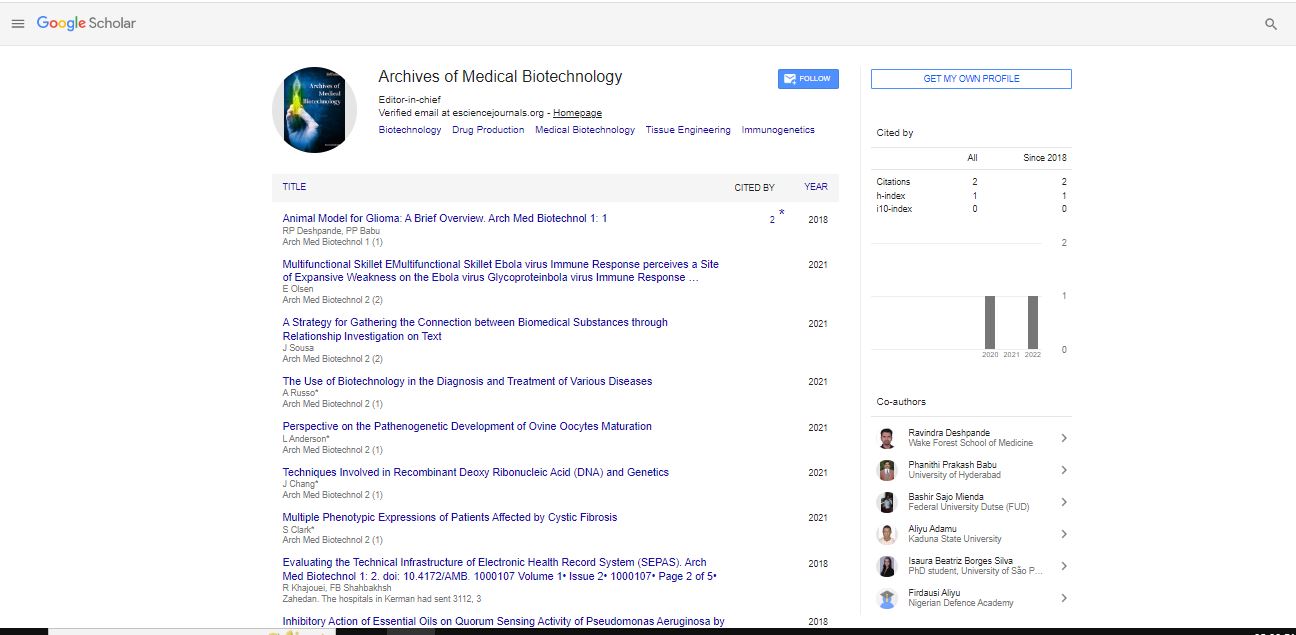Editorial, Arch Med Biotechnol Vol: 6 Issue: 1
Stem Cell Applications in Medical Biotechnology
Anil Verma*
Department of Stem Cell Research, All India Institute of Medical Sciences (AIIMS), New Delhi, India
- *Corresponding Author:
- Anil Verma
Department of Stem Cell Research, All India Institute of Medical Sciences (AIIMS), New Delhi, India
E-mail: anil.verma@aiims.ac.in
Received: 01-Mar-2025, Manuscript No. AMB-25-170188; Editor assigned: 4-Mar-2025, Pre-QC No. AMB-25-170188 (PQ); Reviewed: 20-Mar-2025, QC No AMB-25-170188; Revised: 26-Mar- 2025, Manuscript No. AMB-25-170188 (R); Published: 30-Mar-2025, DOI: 10.4172/amb.10000
Citation: Anil Verma, Department of Stem Cell Research, All India Institute of Medical Sciences (AIIMS), New Delhi, India. Arch Med Biotechnol 6:1.
Copyright: © 2025 Anil Verma, this is an open-access article distributed under the terms of the Creative Commons Attribution License, which permits unrestricted use, distribution, and reproduction in any medium, provided the original author and source are credited.
INTRODUCTION
Stem cell research is one of the most promising fields in medical biotechnology. Stem cells, with their self-renewal and differentiation capabilities, offer therapeutic potential in regenerative medicine, genetic disorders, and oncology [1].
Clinical Applications
In India, stem cell transplantation is widely used in treating hematological malignancies and bone marrow failure syndromes. Advances in induced pluripotent stem cells (iPSCs) allow the generation of patient-specific cells, minimizing rejection [2]. Cardiac and neurological applications are under active research. Clinical trials have shown potential benefits of mesenchymal stem cells in cerebral palsy and spinal cord injury [3]. Similarly, stem cell-based therapies for diabetes, where pancreatic beta cells are regenerated, are showing promise [4].
FUTURE CHALLENGES AND DIRECTIONS
Challenges include high treatment costs, ethical concerns, and lack of uniform regulatory frameworks. Nonetheless, India has initiated guidelines through the Indian Council of Medical Research (ICMR) to regulate stem cell therapies [5].
CONCLUSION
Stem cell biotechnology is redefining therapeutic possibilities. With strong research infrastructure and regulatory oversight, India can become a global leader in stem cell-based medicine.
REFERENCES
- Majumdar AS. Stem cell research in India. Indian J Med Res. 2009;129: 250–252.
- Chandra T. iPSCs and regenerative medicine. Stem Cell Res Ther. 2013;4: 72.
- Sharma A. Stem cell therapy for neurological disorders. Ann Neurosci. 2015;22: 208–213.
- Verma A. Beta cell regeneration and diabetes therapy. Indian J Endocrinol Metab. 2017;21: 257–263.
- ICMR. Guidelines for stem cell research in India. Indian Council of Medical Research. 2017.
 Spanish
Spanish  Chinese
Chinese  Russian
Russian  German
German  French
French  Japanese
Japanese  Portuguese
Portuguese  Hindi
Hindi 